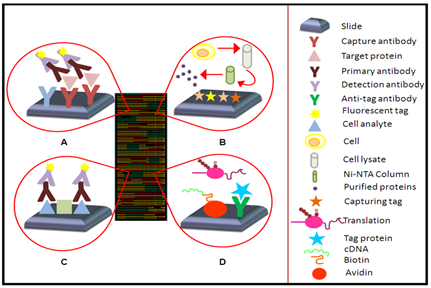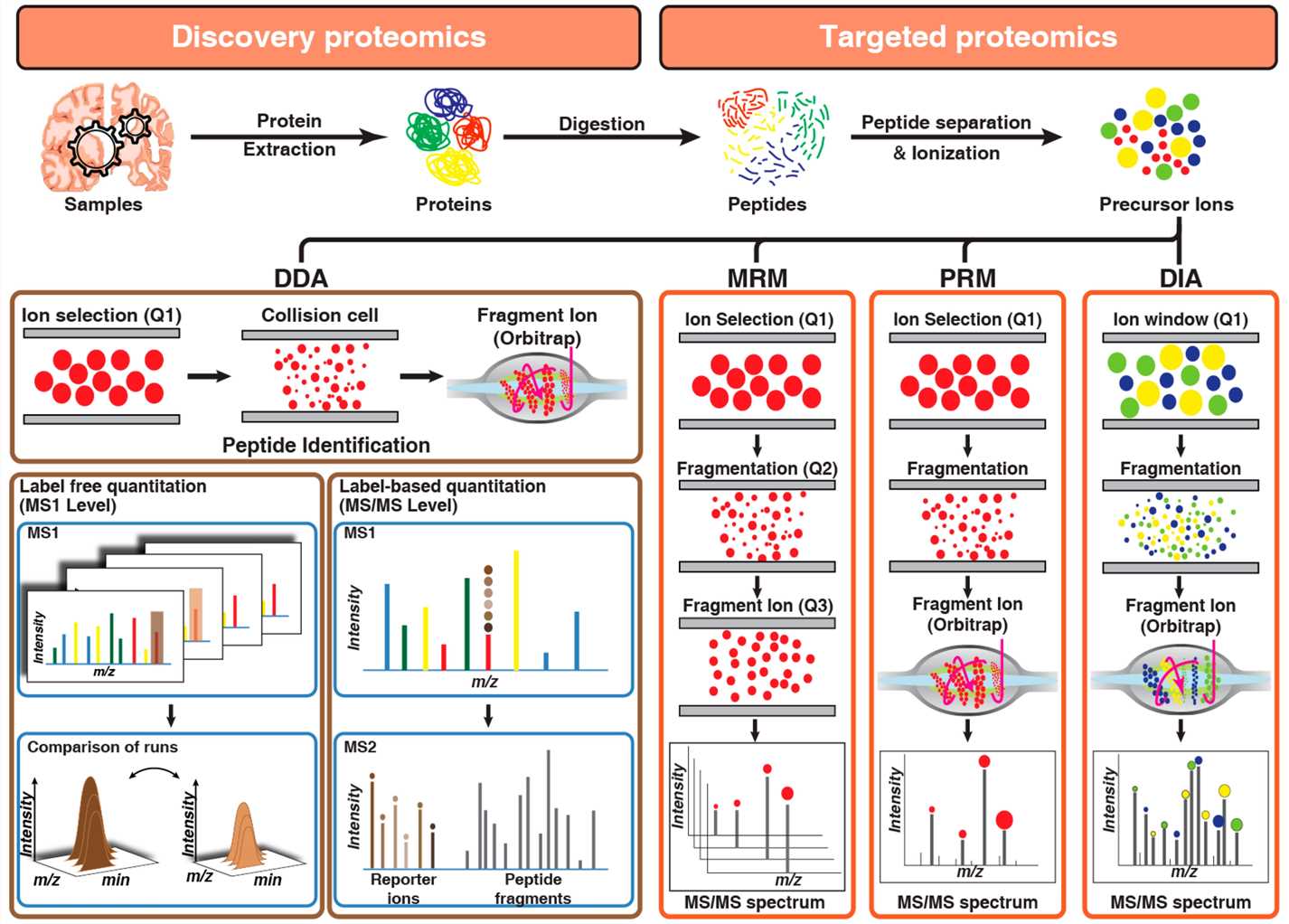Protein biomarker detection has become an integral part of disease detection and protein-based assays hold great promise for in vitro diagnostics (IVD) development. Advances in diagnostic techniques have given rise to methods that are fully capable of biomarker identification for different types of diseases. Creative Biolabs has years of experience in developing and refining diagnosis workflows for the identification of protein biomarkers. Whether you have few samples to assay or wish to do a larger screening, whether you want to analyze some targets or wish to do a large proteomics study, whether you want to study a specific pathway or your custom protein list, Creative Biolabs has one-stop solutions for you.
DNA/RNA vs Protein Biomarkers
While platforms for high-throughput analysis of DNA variants and mRNA expression profiles have been developed and are in broad use, the results have so far been somewhat disappointing, owing perhaps to the inability of nucleic-acid based markers to integrate information related to the downstream processing of proteins that may significantly impact the information content of a marker. (Learn more about our Gene Level Services)
As more is discovered about DNA, RNA, and small RNAs, it is realized that the endpoint is a change in protein. Protein changes caused by gain- or loss-of-function mechanisms via, for instance, protein-protein interaction or post-translational modification may contribute to the etiology of diseases. Among different types of biomarkers, protein analysis is particularly valuable since proteins are more direct mediators of normal and diseased cellular processes and it can be very sensitive to be detected in a very tiny amount of a sample to diagnose a specific type of disease in its early diagnosis. Using specific and targeted protein biomarkers, the scientist will be able to detect samples and confirm diagnoses very early.
Detection Methods
- Protein microarrays for diagnostic assays
Protein microarray technology has enormous potential for IVD. Miniaturized parallelized immunoassays are perfectly suited to generating a maximum of diagnostically relevant information from minute amounts of sample whilst only requiring small amounts of reagent. Protein microarrays have become well-established research tools in basic and applied research. Planar and bead-based microarrays have been developed to detect protein biomarkers in a multiplex fashion.
 Fig.1 Protein microarrays for diagnostic assays.1
Fig.1 Protein microarrays for diagnostic assays.1
- Mass spectrometry assays: hidden importance of antibodies
For proteins either don't have matching antibody pairs or the antibodies are not feasible to detect proteins when few of them are present in the sample, mass spectrometry (MS) provides an attractive alternative that is more effective at identifying proteins. To analyze a given protein in the blood or other biological samples, researchers use an MS approach called selected reaction monitoring (SRM). SRM specifically looks for unique peptides that indicate the presence of a targeted protein.
- New and Emerging Techniques in IVD
The identification and examination of disease markers are currently based on individual proteins, which is not always reliable. For instance, an assay of prostate serum antigen (PSA) is used to screen for prostate cancer, but levels of this antigen are also raised in benign conditions of the prostate. Advances in proteomics technology allow the simultaneous analysis of thousands of low molecular weight proteins, which may reveal patterns of disease and are potentially useful for early detection and assessing prognosis. Therefore, there is a potential to use a panel of diagnostic markers to more accurately identify a given disease state. Proteomics technology is being extensively explored for this purpose and has now become an emerging field in IVD area.
 Fig.2 Proteomics landscape of Alzheimer’s disease.2
Fig.2 Proteomics landscape of Alzheimer’s disease.2
Available Services and Research Methods
From biomarker assay development to primary and secondary screening, Creative Biolabs offers a complete portfolio for your Protein Biomarker Detection and Protein/Nuclear Acid Simultaneous Detection needs. Our methods including but not limited to:
- Mass Spectrometry
- Stable Isotope Labeling with Amino Acids in Cell Culture (SILAC)
- Matrix-Assisted Laser Desorption Ionization-Imaging Mass Spectrometry (MALDI-IMS)
- Activity-Based Protein Profiling (ABPP)
- Reverse Phase Protein Array (RPPA)
- ELISA and Multiplex Assay
- Tissue Microarray and Automated Quantitative Assessment of Immunofluorescence (TMA-AQUA)
Why choose Creative Biolabs for protein biomarker detection?
- High-quality data that you can trust
- The rapid high throughput analysis that your studies deserve
- The most effective use of your precious samples
Technological and scientific innovations over the last decade have greatly contributed to improved diagnostics. Creative Biolabs is constantly integrating and updating existing technical methods and service systems. For any protein detection and analysis services concerning disease diagnosis, please feel free to contact us for more information.
Published Data
1. Multiplexed Quantification of Immunomodulatory Proteins in Clinical Samples Through Targeted Mass Spectrometry
 Fig.3 Development of a targeted, multiplexed immuno-MRM assay.3
Fig.3 Development of a targeted, multiplexed immuno-MRM assay.3
In this work, researchers developed and characterized a multiplex panel of targeted proteomic assays to measure immunomodulatory proteins in human tissue biopsies and biofluids. The assays utilized peptide immunoaffinity enrichment combined with multiple reaction monitoring (MRM)-mass spectrometry, targeting 52 peptides from 46 proteins. The panel demonstrated excellent quantitative performance in both tissue and plasma, exhibiting a broad dynamic range and exceptional precision. Performance metrics revealed a dynamic range spanning over 3 orders of magnitude, with median inter-day coefficients of variation (CVs) of 5.2% (tissue) and 21% (plasma). A feasibility study in clinical biospecimens detected 48/52 peptides in frozen tissue and 38/52 peptides in plasma. This resource is now publicly available for the research community, offering a reliable tool for studying immunomodulatory proteins in the tumor microenvironment and enhancing anti-tumor response research.
References
- Díez, Paula, et al. "Data analysis strategies for protein microarrays." Microarrays 1.2 (2012): 64-83. Distributed under Open Access license CC BY 3.0, without modification.
- Jain, Ankit P., and Gajanan Sathe. "Proteomics landscape of Alzheimer’s disease." Proteomes 9.1 (2021): 13. Distributed under Open Access license CC BY 4.0, without modification.
- Whiteaker, Jeffrey R., et al. "Targeted mass spectrometry enables multiplexed quantification of immunomodulatory proteins in clinical biospecimens." Frontiers in immunology 12 (2021): 765898. Distributed under Open Access license CC BY 4.0. The image was modified by extracting and using only part of the original image.
For Research Use Only.